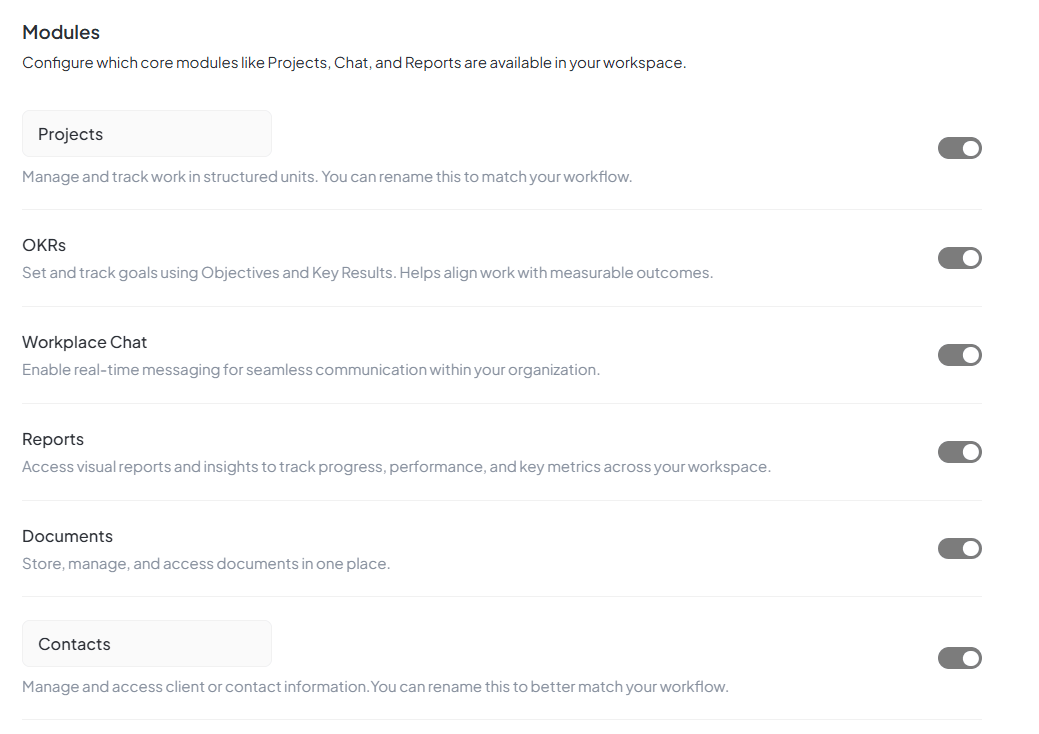Module Settings
Use Module Settings to choose which core features are available in your workspace. Each item is a toggle; turning it on exposes menus, permissions, and UI for that module.
How It Works

Module Settings interface for feature configuration
Who can change it
Owners/Admins (or roles with "Settings: Modules – Edit")
Applies to
Entire workspace (all users)
Data safety
Turning off hides UI but doesn't delete data
Renaming
Some modules support custom display names
Important Notes
Applies to entire workspace (all users), unless a module's own permissions restrict access
Data safety: Turning a module off hides its UI but does not delete data. You can re-enable later
Renaming: Some modules (e.g., Projects, Contacts) support custom display names to match your terminology
Core Modules
1) Projects
Manage and track work in structured units (projects/boards)
Enables
- Projects menu, project creation
- Task lists/boards
- Project roles & permissions
Dependencies
None; integrates with Docs, Reports, and Chat if those are enabled
Good for
Tips
Keep project templates ready for repeatable work; align statuses with your task settings
2) OKRs
Set and track Objectives and Key Results to align work with outcomes
Enables
- OKR hierarchy (Company → Team → Individual)
- Alignment view, check-ins
- Progress formulas
Dependencies
Optional link to Projects/Tasks for auto-progress; Reports surfaces OKR insights
Good for
Tips
Define a cadence (e.g., weekly check-ins) and owner for each objective
3) Workplace Chat
Real-time messaging for teams and projects
Enables
- Channels (group/project), DMs
- Mentions, file replies
- Notifications
Dependencies
None; attaches context to Projects/Tasks/Documents if those modules are on
Good for
Tips
Create default channels per project; use naming conventions (e.g., #proj-acme)
4) Reports
Dashboards and visual analytics across projects, tasks, and OKRs
Enables
- Workspace reports
- Progress, throughput, workloads
- Timelines, OKR health
Dependencies
Pulls data from Projects/Tasks/OKRs; without them, reports will be minimal
Good for
Tips
Save report presets per role (e.g., Managers vs Execs)
5) Documents
Central place to store and access files
Enables
- Document library
- File attachments to tasks/chats
- Version history (where supported)
Dependencies
None; enhances Projects/Chat
Good for
Tips
Establish folder conventions; restrict sensitive folders via permissions
6) Contacts
Manage clients/partners or internal contact records
Enables
- Contact directory
- Linking contacts to projects/tasks
- Basic CRM-style fields
Dependencies
None; can be referenced in projects, tasks, approvals
Good for
Tips
Add custom fields (e.g., Account Owner, Tier, Billing Email)
Optional Features
Reminders
Allow users to set reminders for tasks, notes, meetings, or arbitrary dates
Enables
Reminder UI in composer/records, notifications at due times
Scope
Personal (each user manages their own)
Tip
Encourage reminders for handoffs and follow-ups to reduce manual chasing
My Notes
Personal or work-related notes that aren't part of a project
Enables
Private notes, quick capture, and simple organization
Scope
Private by default; share/export if needed
Tip
Use for ideas, meeting prep, or scratchpads. Doesn't replace Documents for team-shared content
App-Wide Search Option
Global search in the top/tab bar across all enabled modules
Enables
Command-palette or header search to find people, tasks, projects, docs, chats
Scope
Workspace-wide search functionality
Tip
Train users on search operators (e.g., assignee:me status:open) if supported
Module Dependencies Overview
| Module | Dependencies | Integrations |
|---|---|---|
| Projects | None | Docs, Reports, Chat (if enabled) |
| OKRs | Optional: Projects/Tasks | Reports for insights |
| Workplace Chat | None | Projects, Tasks, Documents |
| Reports | Projects/Tasks/OKRs | All data sources |
| Documents | None | Projects, Chat |
| Contacts | None | Projects, Tasks, Approvals |